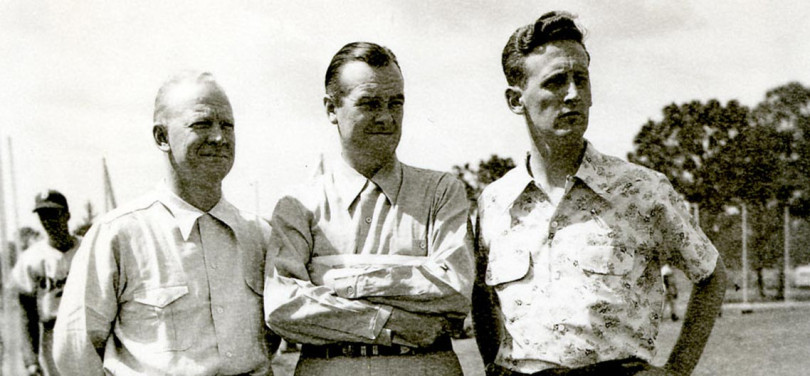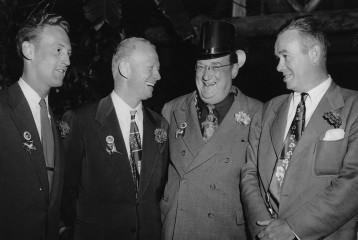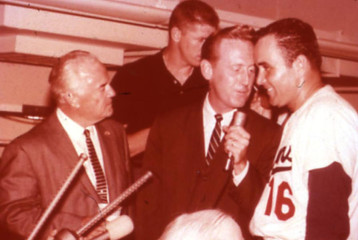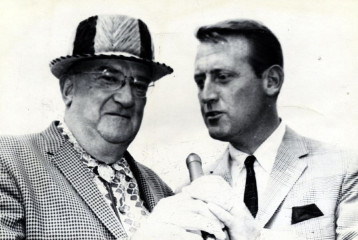
Reference Biography: Walter O’Malley
The Red Head is a Big Hit
Vin Scully, the brilliant broadcaster, who had started his career under the watchful eye of mentor Red Barber and his sidekick Connie Desmond, was a major reason Dodger fans became Dodger fans in Los Angeles. Barber had been Scully’s “father” figure, while Desmond was like an older brother that he never had. Undoubtedly, Scully learned so much from those two by observation and through extensive preparation. When the team moved from Brooklyn, O’Malley wanted Scully to continue his broadcasting career in Los Angeles. O’Malley loved the talented young red-haired announcer like his own son, Peter.
Once, when Scully’s first contract in 1950 expired and he wasn’t sure of his future under the new O’Malley ownership, the telephone rang. Scully answered it and O’Malley was on the line. “Don’t worry about next season. We want you to come back and be our broadcaster again. See you in the spring,” said the Dodger President. Scully recalls that the owner of the ballclub certainly had more important things to do with his time than to worry about the third broadcaster of the team, who was just a 22-year-old kid at that. Maybe an assistant or secretary would call and let him know everything would be fine. But, no, it was the boss and he took the time to let Scully know not to worry. “It made me feel very special and happy,” Scully said of O’Malley. “He was the heart and soul of the Dodgers.”

Dodger broadcasters (L-R) Vin Scully, Red Barber, and Connie Desmond with Walter O’Malley at the Dodgers’ 1952 St. Patrick’s Day party, Vero Beach, Florida.

Vin Scully interviews relief pitcher Ron Perranoski in the jubilant Dodger clubhouse following the Dodgers’ four-game sweep of the New York Yankees in the 1963 World Series. Dodger Vice President and Director, Minor League Operations Fresco Thompson is on far left and in the background wearing a black shirt is Dodger slugger Frank Howard.
Copyright © Los Angeles Dodgers, Inc.

Vin Scully interviews Walter O’Malley at Dodgertown in Vero Beach, FL. O’Malley once responded to the question, “Who is the greatest Dodger?” by replying, “It’s Scully.”
Scully’s colorful descriptions and the transistor radio were catalysts for bringing fans to the Coliseum — and later to Dodger Stadium. Sitting 80-plus rows above the action, Dodger fans relied on Scully’s call of the game to tell them what was happening — even when they were at the game! It was later said, “Unless Vin Scully tells us that it happened, it didn’t happen!” That kind of trust in a broadcaster by the fans gave him a Hall of Fame career of 67 seasons. But, it also speaks volumes about Scully’s ability to woo families and especially women to the ballpark. If a listener did not understand the nuances of the game, Scully taught the fan with his poetic descriptions and storytelling style. The Dodgers, under O’Malley’s ownership, always welcomed families to the stadia. But Scully was a large part of bringing those families back, time and time again.
If he said to buy Union Oil gasoline, they did. If he said to buy Farmer John Dodger Dogs, they did. If he told children that it was free souvenir “Helmet Day” on Sunday and not to miss it, they didn’t. The impressive power of his voice made him Southern California’s most known, respected and loved radio personality. The vast number of people who brought radios to the Coliseum, and later to Dodger Stadium, meant that a fan could walk anywhere throughout the stadium and parking lots and Vin Scully’s mellifluous voice could be heard. Of course, Scully’s partner Jerry Doggett was also extremely popular with Dodger fans. He joined the Brooklyn Dodgers in 1956 and was one of four announcers, along with Scully, Connie Desmond and Al Helfer. As the number two man in the booth when the Dodgers came west, Doggett knew his role was not to challenge Scully but to stay in the background and complement him. The tandem worked to perfection.
“People ask me, ‘who is the greatest Dodger?’” O’Malley said. “It’s Scully. You know we hired him right out of school.” Boston Globe, Sports Plus, July 28, 1978 Obviously, Scully’s loyalty to O’Malley and his family was rewarded for nearly half a century.
“Mr. O’Malley always said if the Dodgers had lost that (day) game (on June 1, 1958) it would have influenced the referendum voting back in Los Angeles,” said Scully. “No one votes for a loser. He truly felt winning that game helped win the referendum.” Dennis McCarthy, L.A. Daily News, Sept. 26, 1983
Initially, O’Malley and the Dodgers did not plan to have road games aired on local television, but he decided on April 27, 1958 to place all away games from San Francisco on KTTV Channel 11 beginning with the May 9 game. It was the beginning of a longtime partnership with Channel 11 that lasted for 34 years.

